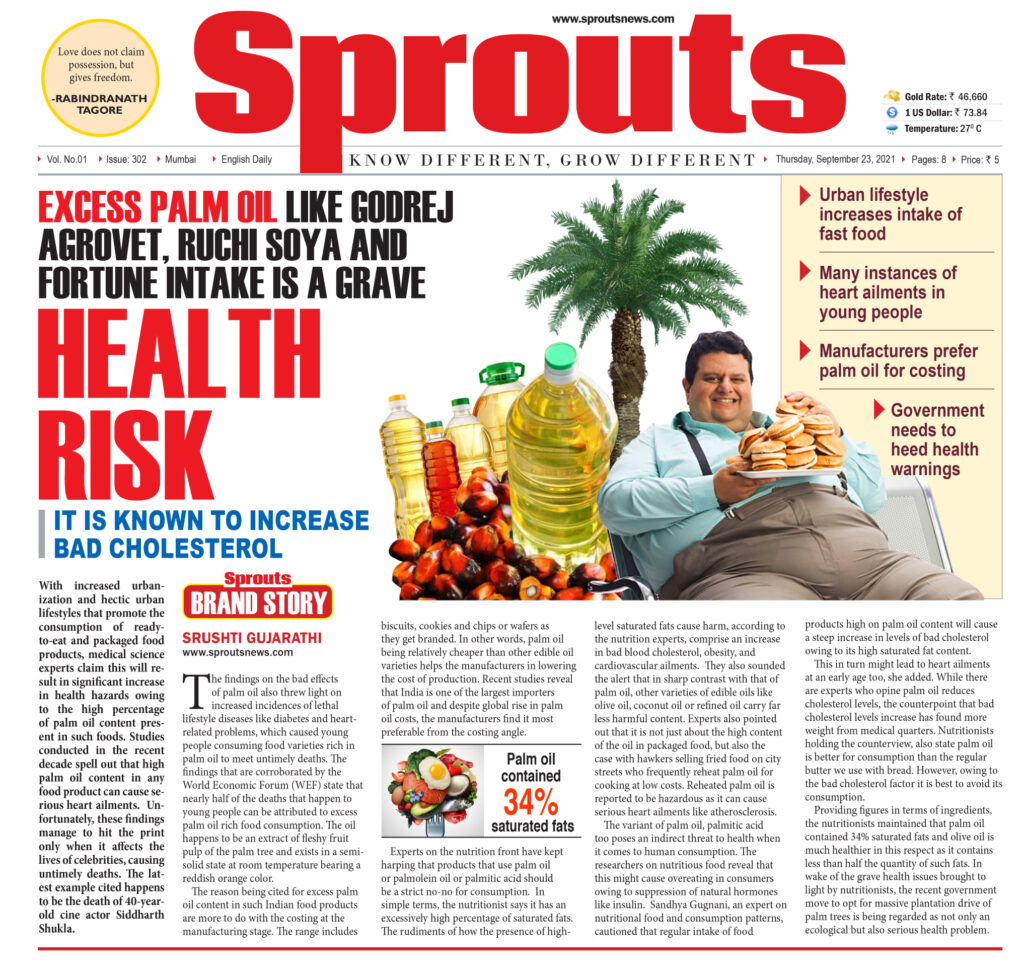
With increased urbanization and hectic urban lifestyles that promote the consumption of ready-to-eat and packaged food products, medical science experts claim this will result in significant increase in health hazards owing to the high percentage of palm oil content present in such foods. Studies conducted in the recent decade spell out that high palm oil content in any food product can cause serious heart ailments. Unfortunately, these findings manage to hit the print only when it affects the lives of celebrities, causing untimely deaths. The latest example cited happens to be the death of 40-year-old cine actor Siddharth Shukla.
The findings on the bad effects of palm oil also threw light on increased incidences of lethal lifestyle diseases like diabetes and heart-related problems, which caused young people consuming food varieties rich in palm oil to meet untimely deaths. The findings that are corroborated by the World Economic Forum (WEF) state that nearly half of the deaths that happen to young people can be attributed to excess palm oil rich food consumption. The oil happens to be an extract of fleshy fruit pulp of the palm tree and exists in a semi-solid state at room temperature bearing a reddish orange color.
The reason being cited for excess palm oil content in such Indian food products are more to do with the costing at the manufacturing stage. The range includes biscuits, cookies and chips or wafers as they get branded. In other words, palm oil being relatively cheaper than other edible oil varieties helps the manufacturers in lowering the cost of production. Recent studies reveal that India is one of the largest importers of palm oil and despite global rise in palm oil costs, the manufacturers find it most preferable from the costing angle.
Experts on the nutrition front have kept harping that products that use palm oil or palmolein oil or palmitic acid should be a strict no-no for consumption. In simple terms, the nutritionist says it has an excessively high percentage of saturated fats. The rudiments of how the presence of high-level saturated fats cause harm, according to the nutrition experts, comprise an increase in bad blood cholesterol, obesity, and cardiovascular ailments. They also sounded the alert that in sharp contrast with that of palm oil, other varieties of edible oils like olive oil, coconut oil or refined oil carry far less harmful content. Experts also pointed out that it is not just about the high content of the oil in packaged food, but also the case with hawkers selling fried food on city streets who frequently reheat palm oil for cooking at low costs. Reheated palm oil is reported to be hazardous as it can cause serious heart ailments like atherosclerosis.
The variant of palm oil, palmitic acid too poses an indirect threat to health when it comes to human consumption. The researchers on nutritious food reveal that this might cause overeating in consumers owing to suppression of natural hormones like insulin. Sandhya Gugnani, an expert on nutritional food and consumption patterns, cautioned that regular intake of food products high on palm oil content will cause a steep increase in levels of bad cholesterol owing to its high saturated fat content. This in turn might lead to heart ailments at an early age too, she added. While there are experts who opine palm oil reduces cholesterol levels, the counterpoint that bad cholesterol levels increase has found more weight from medical quarters. Nutritionists holding the counterview, also state palm oil is better for consumption than the regular butter we use with bread. However, owing to the bad cholesterol factor it is best to avoid its consumption.
Providing figures in terms of ingredients, the nutritionists maintained that palm oil contained 34% saturated fats and olive oil is much healthier in this respect as it contains less than half the quantity of such fats. In wake of the grave health issues brought to light by nutritionists, the recent government move to opt for massive plantation drive of palm trees is being regarded as not only an ecological but also serious health problem.
[inhype_block type=”postsgrid7″ block_title=”Also Read” block_posts_type=”latest” block_categories=”” block_posts_limit=”4″ block_posts_loadmore=”no” block_posts_offset=”0″]











